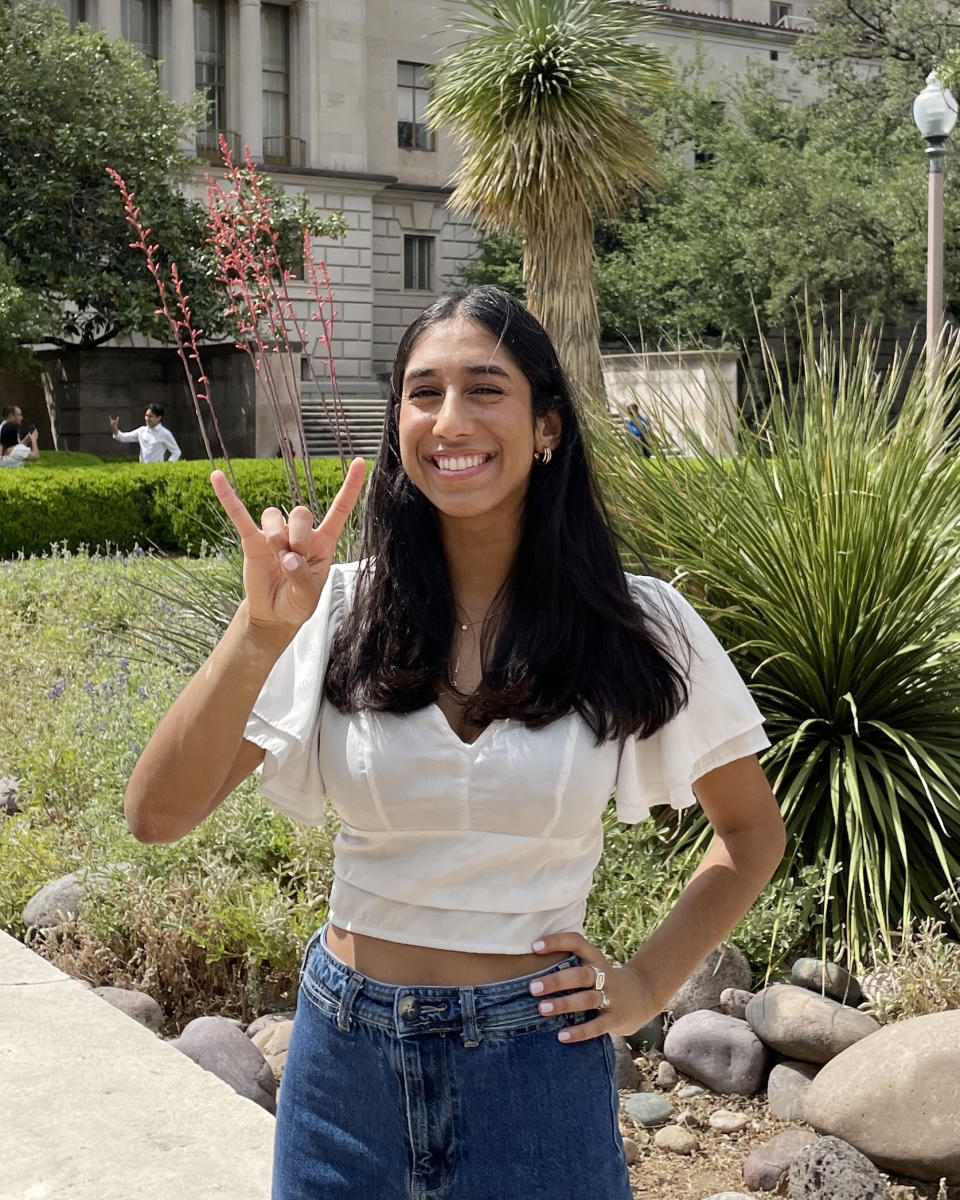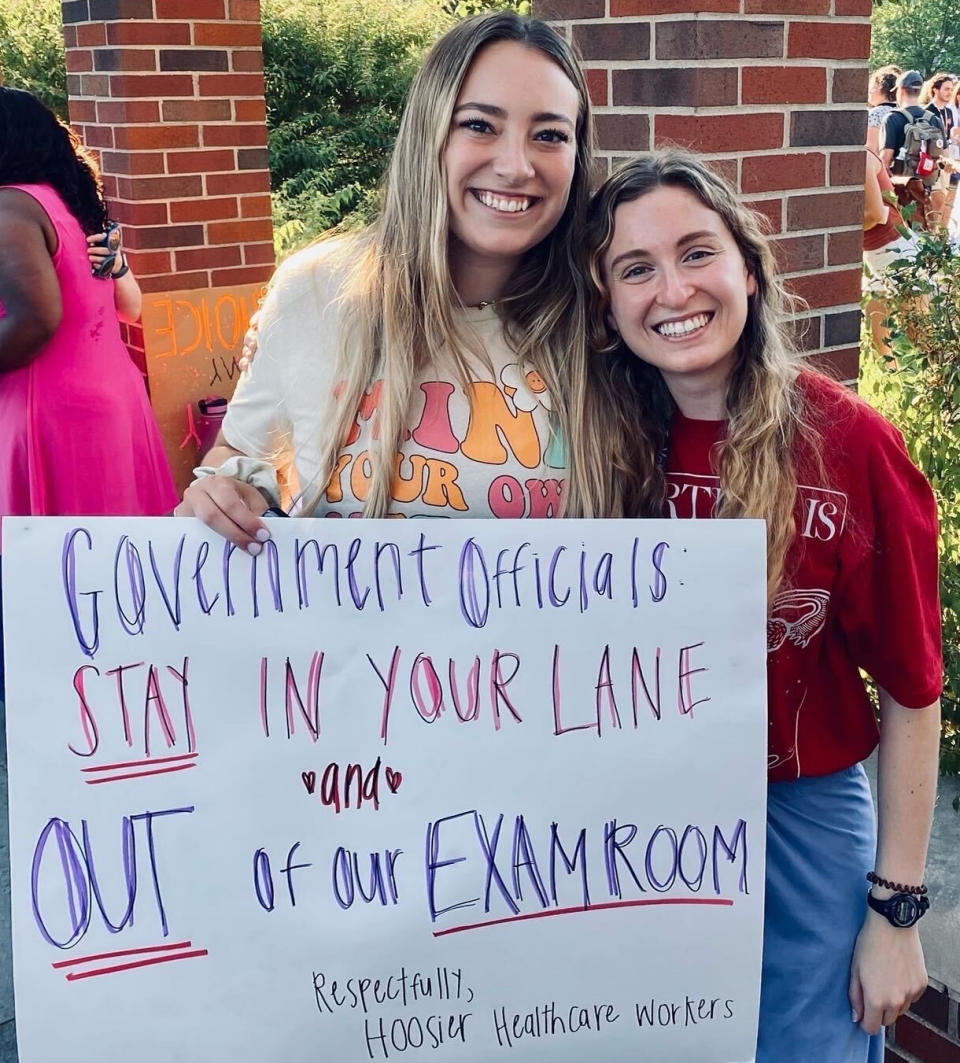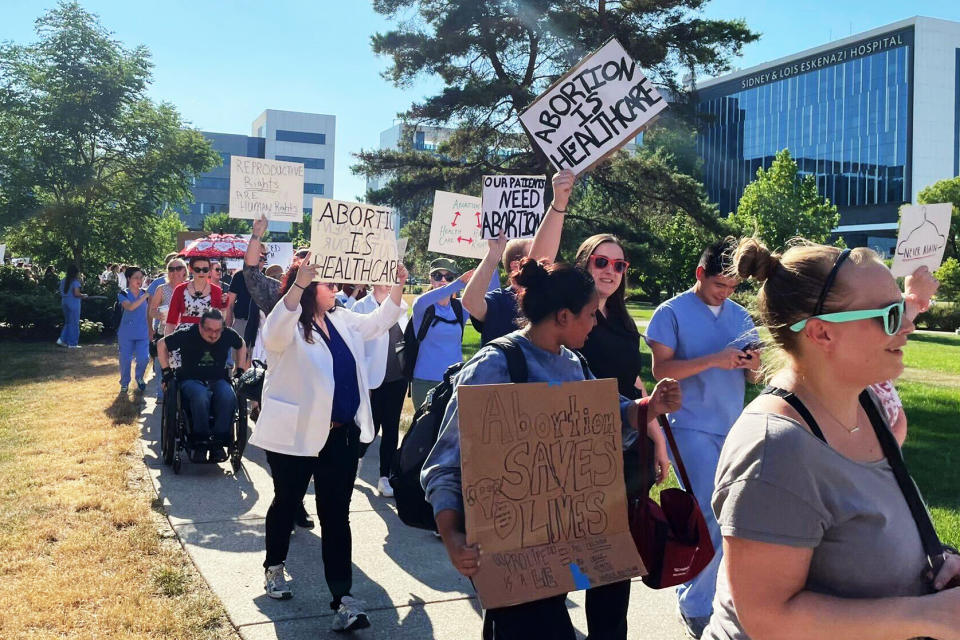Students and activists mobilize on campus for reproductive rights in states with abortion bans
College students and advocates returning to campus for the first post-Roe school year already are making plans for a counterattack in states where abortion has been banned or severely restricted.
They're gearing up with emergency contraceptives, condoms, pregnancy tests, voter registration drives and — where possible — information about abortion access in response to the rollback of the constitutional right to the procedure.
“We have to do what we can legally to help people as much as we can,” Nikita Kakkad, a junior at the University of Texas at Austin and an activist for reproductive rights, said. “It’s important to be doing that now more than ever.”
Texas is one of more than a dozen states that has banned or severely restricted abortion procedures after the Supreme Court overturned Roe v. Wade in June. The state had already passed a law in 2021 that effectively banned abortions around six weeks of pregnancy, and its "trigger law" prohibiting nearly all abortions and increasing penalties for performing, inducing or attempting an abortion is set to go into effect Aug. 25.

Kakkad, who is also on the student board for the American Society for Emergency Contraception, is focusing most of her efforts on preventing pregnancies on the college campus of more than 50,000 students. She plans to organize events to educate students on reproductive health services and help provide free Plan B, the emergency contraception medication taken to prevent pregnancy. The American Society for Emergency Contraception has also been advocating for campuses to install vending machines with emergency contraception in order to increase access and affordability for students.
“I think that just genuinely getting it in the hands of people before something goes wrong, rather than scrambling to fill requests after something goes wrong, is going to be really important,” Kakkad said.
Still, she said, contraceptives do not negate the need for abortions and she hopes being vocal about reproductive health activism and access to abortion can help students who are fearful.
“I think it’s made it really pressing to talk about it. I’m not breaking the law by saying the word ‘abortion.’ Let’s promote information about how you can cross state lines to get abortions, all of that we can do,” she said.
Women in their 20s accounted for more than half of abortions in the U.S. in 2019, according to the Centers for Disease Control and Prevention.
Research shows that forcing some women to carry unplanned pregnancies to term affects their education, career advancement, earning power and ability to build wealth.
Just 8% of single mothers earn a college degree within six years of enrolling, compared with about half of women who are not mothers, according to the Institute for Women’s Policy Research. Single mothers who are college students were also disproportionately more likely to live in or near poverty, with 88% having incomes below 200% of the federal poverty line, according to the institute.
The impact of women’s equality and participation in the workforce is also costing states and the nation economically, the institute said, estimating that state-level abortion restrictions cost state economies $105 billion per year, “by reducing labor force participation and earnings levels and increasing turnover and time off from work among women ages 15 to 44 years.”
Since the fall of Roe, there has since been an influx of students seeking to become involved with reproductive rights, said Tamara Marzouk, director of youth abortion access at the nonprofit Advocates for Youth.
Before the Supreme Court decision, there were 500 to 600 people in the group’s Youth Abortion Support Collective, a network of young people trained to educate and support their community's abortion and abortion advocacy needs.
“Overnight, we had 150 young people join our collective or apply to join the collective. And since then, now we’re nearly at 900,” she said. “Tons of young people are showing up and trying to really support one another and learn more about how they can get plugged in, both in their communities and on a larger scale as well.”
Nimisha Srikanth, a senior at Texas A&M University and president of the group Feminists for Reproductive Equity & Education, said her group will increase its advocacy, with a "main focus" on providing sexual health resources.
“We’re going to be really trying to amplify that and promote that more, because always after Texas does something related to reproductive health, we’ve seen an uptick in requests for Plan B,” Srikanth said.
“If you’re a student, you can contact us. We’ll give you Plan B, condoms, pregnancy tests, other reproductive health products that people might need to maintain that bodily autonomy,” she said.
Srikanth said the group will also be providing opportunities to volunteer and plans to host a voter registration drive in the fall to get people registered for the midterm elections.
“Our big goal is to provide more advocacy events, provide more information for students concerned about these issues and then, of course, maintain our resource services,” she said.
Still, she acknowledged that the new legal landscape after Roe’s reversal will make it important to continue providing services and other aid while remaining within the bounds of the law.
“We’re doing our best to still help the community, empower the community but not get ourselves or maybe those who may be seeking help prosecuted,” she said.
While there has been greater student involvement in issues related to reproductive rights since the Supreme Court's decision, the responses from colleges themselves have been varied based on factors including location and gender makeup of the student body, with some outwardly opposing or supporting the ruling and others taking a more neutral stance.
For example, some conservative colleges have celebrated the ruling, while some colleges in states that have abortion protections have come out strongly against the decision, and many others have said they were assessing the ruling and its impact for their campuses.
In Indiana, medical students Lucy Brown and Sydney DiGregory were careful to note that they spoke only for themselves and not on behalf of their school, the Indiana University School of Medicine.
“We are just medical students in Indiana who have concerns with how the state has treated us,” Brown said. “It’s been really kind of demoralizing to see how the state and the government is treating OB-GYNs and not really valuing their opinions.”
This month, Indiana became the first state to approve a near-total ban on abortion following the Supreme Court’s decision. The new law, which goes into effect Sept. 15, severely restricts abortion with limited exceptions for when the life of the pregnant person is at risk, when there are fatal fetal abnormalities, and in some cases of rape or incest.
On Aug. 9, in response to the ban, the Indiana University School of Medicine said in a statement that it had been working to prepare “for the changes new legislation regarding reproductive health care will bring for our patients, faculty, residents, students and staff.” But the dean, Jay Hess, provided few other details.
“This summer has been difficult, with the uncertainty of this legislation’s impact on our mission at IU School of Medicine weighing heavily on many of your minds,” Hess said in the statement. “But the passion and commitment I have seen from so many of you to continue training future healers and providing lifesaving care to Hoosiers makes me confident we are up to this challenge.”
The ban has left some medical students that provide reproductive health services for women in Indiana reeling.
“We’re cleaning up the mess that our legislators have made,” said Brown, a fourth-year student. “We can’t go back and change the law that was passed, but we can kind of prevent people from being directly affected by it.”
“I’m just dreading that moment when a patient comes after Sept. 15 and I have to tell them, 'Sorry, we can’t do anything for you,'” said Brown, who is also the chair of a women’s health clinic at the university.
Brown said student groups were also partnering to increase free access to contraceptives, including long-acting contraception such as IUDs, and educating students on their options.

DiGregory, who also is a fourth-year student, said when the Supreme Court decision came down she was minutes from rolling a patient into the operating room for an abortion procedure because of fatal fetal anomalies.
The attending physician “had tears rolling down her face. The nurses we were with, we all just had a moment of silence. Kind of like a shocked, stunned silence,” said DiGregory, who is also chair of the OB-GYN student interest group at the university.
“Every patient that we were able to take care of since, that was like, OK, one more. We get to help one more patient, and it kind of meant even more with each person that we were able to provide the services for,” she said.

As more states consider abortion restrictions, campus advocacy will become even more important in states with upcoming ballot measures on abortion rights, said Margaret Velto, an outreach coordinator with the Kentucky Religious Coalition for Reproductive Choice.
Kentucky had a near-total ban on abortions after the state’s trigger law went into effect with the Supreme Court’s decision. But in November, the state will vote on a proposed amendment to its constitution to add the language, “to protect human life, nothing in this Constitution shall be construed to secure or protect a right to abortion or require the funding of abortion.”
“That one is going to be a huge priority to get people educated about it,” Velto said. “Because it would make any other attempt at making abortion legal in Kentucky practically impossible.”

